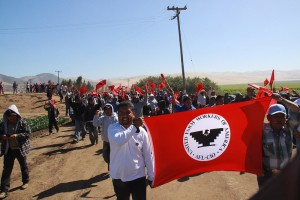
The Diary of Joaquin Magon Entry 20
About a month ago, I was talking to workers on strike at Nob Hill, a chain of high-end grocery stores, trying to figure out what moved them to take this major step. The majority of the workers picketed outside the store in spite of the big sign on the front doors: “Now Hiring Replacement Workers.”
I went inside the store and saw it was empty; the stock of dairy products was almost depleted and the bread was going stale. And I saw how much work the strikers had done to make this a successful strike. I contemplated some of my favorite moments working with Unions. I think of the strike at Amarral and began to compare the two and the lessons both have taught me.
A strike is effective for two main reasons: (1) it forces the employer to negotiate with the workers as quickly as possible or else risk losing money and (2) it makes the workers realize the power that they hold.
It can be argued that a strike is the hardest thing to which a worker can commit. There is the risk of being replaced by scabs, the risk of being fired, the risk of being singled out by the employer, and, in some instances, the risk of being arrested.
But even with those risks, strikes continue and the striker holds a romantic image of the union man or union woman walking off work, picket sign in hand, showing the world that they can, indeed, change their conditions in the work place.
The Target Is The Profit
The strike is a work stoppage, a stoppage of the production of the materials or services that the “boss” needs to sell in order to make a living. By going out on strike the worker puts the owner in a tough spot, the owner must negotiate as quickly as possible or risk losing his investors.
In Amarral, the workers stopped harvesting the vegetables that needed to be sold and shipped off to stores such as Nob Hill. For Nob Hill, the workers stopped offering the service that the customer needs to successfully purchase the products sold in the store.
Along with that, the employer risks gaining publicity as an exploiter, and big brand companies and stores will not want to be affiliated with such a person if publicity gets so risky that it might lead to a boycott of the stores purchasing the product. This is what made the United Food and Commercial Workers (UFCW) strike so successful – the workers connected with the customers to the point where most customers left the store without having bought anything or didn’t go into the store at all.
All workers have power.
There exists an invisible agreement between the employer and the employee that is central to all working relationships. When there are more workers than jobs, the worker has low value; when there are more jobs than workers, the worker has high value.
And often times it happens that workers are not aware of their rights or their power. This happens more in industries where the majority of the workforce carries barriers of different dimensions such as language, legal status, and knowledge of worker rights. But when workers learn that they have power, they can manifest it and take action.
I used to believe that a strike was more effective in industries where the workers have more power due to high demand. That is to say, in times where the unemployment rate is low.
In Amarral the workers knew that they weren’t going to be replaced – there aren’t many agricultural workers right now. But even in Nob Hill, where there are hundreds of people that would willingly take a job at a grocery store, the workers still went on strike. It all goes to show that the most important thing needed in a strike is a worker’s conviction.
The Importance of Collective Unity
In order for a strike to be effective each worker must believe that there exists at least one injustice in the workplace that the worker connects to on a personal level.
The second is the issue-based communication that fosters a strong bond between the workers where they reassure each other that when they do decide to go on strike no one will back down. This bond is the glue that cements the bridge between thought and action. And, of course, each worker has their individual conviction. One cannot go out on strike without truly feeling the cause, because in the end they will easily lose momentum and return to work.
When we were at Amarral we saw conviction unlike any other. There were those that went out on strike but then returned to work. They did not have the conviction necessary and were easily scared off by their employer. The same occurred in Nob Hill.
This is what makes going out on strike so difficult. It’s a direct confrontation with the employer. In a regular union election, a worker can sign an authorization card and support in complete secrecy. In a strike there is no hiding. The employer knows who the union supporters are.
We are all workers
A strike is a weapon, an option that all of us as workers or as future workers have and must preserve. We as workers must always remember the power that we have.
It is only by acknowledging our own power, and by knowing our rights that we, as workers, will not allow ourselves to be exploited, to be taken advantage of, and to act when employers and laws seeks to take that power from us; and we will not give up.
“The Diary of Joaquín Magón” is written by Jesús E. Valenzuela Félix, a reporter from Coachella living in Salinas and working for the United Farm Workers Foundation. He contributes regularly to Coachella Unincorporated.
